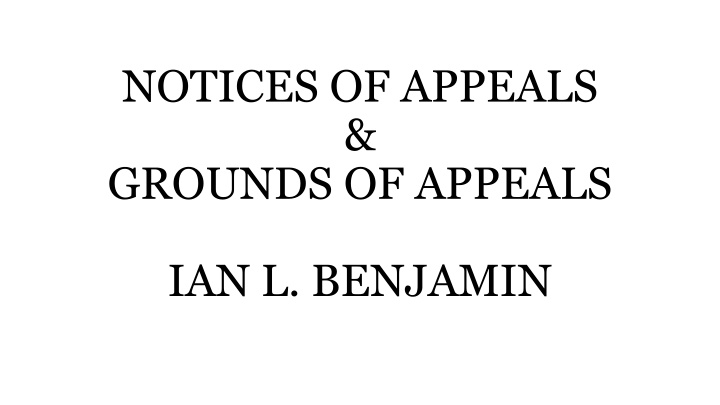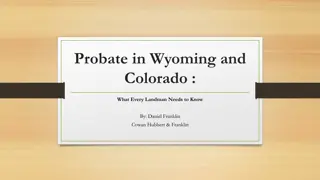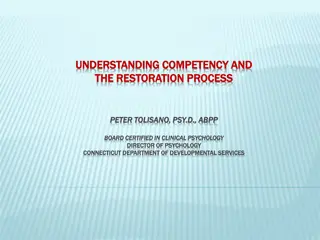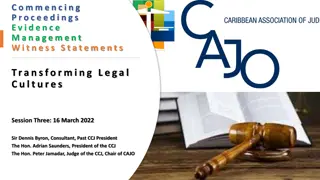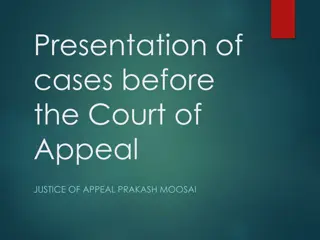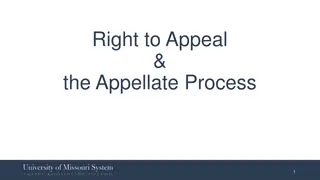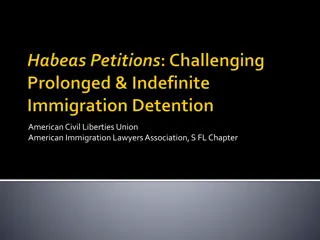Rights of Appeal in Legal Proceedings
This text discusses the statutory rights of appeal against decisions in legal proceedings, highlighting the importance of understanding the procedures and enactments that govern the appeals process. It specifically focuses on appealing decisions to the High Court related to various professional bodies in Trinidad and Tobago, outlining specific sections and timelines for lodging appeals. The text emphasizes the appellate nature of appeals to a Judge in Chambers and the Court, with the authority to substitute, set aside, amend, or vary decisions.
Download Presentation

Please find below an Image/Link to download the presentation.
The content on the website is provided AS IS for your information and personal use only. It may not be sold, licensed, or shared on other websites without obtaining consent from the author.If you encounter any issues during the download, it is possible that the publisher has removed the file from their server.
You are allowed to download the files provided on this website for personal or commercial use, subject to the condition that they are used lawfully. All files are the property of their respective owners.
The content on the website is provided AS IS for your information and personal use only. It may not be sold, licensed, or shared on other websites without obtaining consent from the author.
E N D
Presentation Transcript
NOTICES OF APPEALS & GROUNDS OF APPEALS IAN L. BENJAMIN
RIGHTS OF APPEAL - STATUTORY All rights of appeal against any decision are statutory based. It is vital for an Attorney to Law to identify the enactment and procedures that give rise to the right to appeal. Some appeals are to the High Court and others are to the Court of Appeal. 2
Appealing Decisions to the High Court Many of these relate to the Boards of various professions bodies in Trinidad and Tobago 3
1. Tobago Decisions of the Council of the Medical Board of Trinidad and I. Appeals are pursuant to Section 29 of the Medical Board Act which sets out II. The appeal is against the refusal of the Council to grant registration or temporary licence, an order for suspension of licence for less than 2 years or revocation or suspension of licence; III. The appeal must be within 3 months after the date of the notice by the Council of their decision; 4
Section 29 gives the right of appeal from the decision of the Council to a Judge in Chambers. The appeal to a Judge in Chambers is truly appellate and is not supervisory. So too is the appeal to this Court. This Court is therefore fully entitled to substitute its own decision and set aside the decision of the Council and the Court below. It may also amend or vary it. Mendonca JA 5
2. Decision of the Land Surveyors Board or Disciplinary Committee I. Appeals are pursuant to Section 58 of the Land Surveyors Act except for assessment of academic qualifications, training or relevant experience for any application for registration; II. Appeals are to be brought within one month of the decision; 6
3. Decisions of the Nursing Council of Trinidad and Tobago I. Appeals are pursuant to Section 38 of the Nursing Personnel Act; II. Appeals are to be made with one month of the decision; III. Appeals for decisions relating to nursing interns or nursing are to the Minister of Health within one month and the Minister s decision is final; 7
4. Decisions of the Board of Inland Revenue Appeals of decisions of the Board of Inland Revenue are made to the Tax Appeal Board pursuant to section 87 of the Income Tax Act I. Appeals are available to the tax appeal board when a person has issued a notice of objection to the Board of Inland Revenue and is dissatisfied with the decision of the board; II. A notice of objection is done pursuant to section 86 of the Income Tax Act; 8
Section 7 of the Tax Appeal Board Act provides Notice of appeal to be filed with the Registrar of the Tax Appeal Board within 28 days of the notification or service of the decision of the Board of Inland Revenue; An appeal can be instituted out of time but the Board has to be satisfied that there was reasonable cause and that the appeal was brought without unreasonable delay; 9
5. Decisions of the EMA Environmental Commission has the jurisdiction to hear and determine appeals from decisions or actions by the EMA specifically authorised under the EMA Act per section 81(5) of the Environmental Management Authority Act; 10
Section 85 of the EMA Act sets out the appeals procedure : I. File notice of appeal with the Registrar of the Commission and serve a copy on the Secretary or other respondent; II. Notice of appeal specifying the dispute and grounds of appeal has to be filed within 28 days but appeals can be filed out of time with reasonable cause for not appealing and it was filed without unreasonable delay; 11
6. Decisions of the National Insurance Board Section 62 of the National Insurance Act set out that appeals on questions of fact lies to the National Insurance Appeal Tribunal while questions of law or partly of law and partly of fact are appealed to the High Court. There is a further appeal of mixed questions to the Court of Appeal; The procedure of appeals is governed by the National Insurance (Appeal) Regulations. 12
7. Criminal decisions of the High Court Section 39, 42 to 65 deals with Criminal proceedings; 13
DPP Criminal Review Under section 36 of the Supreme Court of Judicature Act DPP has power to seek review for material error in the proceedings of the inferior court As Bereaux JA put it: that while the Court of Appeal s jurisdiction was not to be exercised readily or routinely , I can see no reason why the remedy ought not to be available to the Director during the course of committal proceedings, in an appropriate case. 14
8. DPP may launch Criminal Appeal 65E. (1) Section 63 notwithstanding, the DPP may appeal to the Court of Appeal (a) against a judgment or verdict of acquittal of a trial Court in proceedings by indictment when the judgment or verdict is the result of a decision by the trial Judge to uphold a no case submission or withdraw the case from the jury on any ground of appeal that the decision of the trial Judge is erroneous in point of law; (b) with leave of the Court of Appeal or a Judge thereof, against the sentence passed by a trial Court in proceedings by indictment, unless that sentence is one fixed by law. 15
Time for DPP Appeal 65F. (1) the Director of Public Prosecutions shall give notice of appeal or notice of his application for leave to appeal, in such manner as may be prescribed by Rules of Court within fourteen days of the date of the verdict of acquittal or sentence passed. (2) The Court of Appeal or a Judge thereof may at any time extend the time within which notice of appeal or notice of an application for leave to appeal may be given. 16
Criminal Appeal Conviction & Sentence sec 43 conviction on any ground of appeal which involves a question of law alone; with the leave of the Court of Appeal or upon the certificate of the Judge who tried him that it is a fit case for appeal against his conviction on any ground of appeal which involves a question of fact alone, or a question of mixed law and fact, or any other ground which appears to the Court to be a sufficient ground of appeal; with the leave of the Court of Appeal against the sentence passed on his conviction, unless the sentence is one fixed by law see Francis decision CA- 17
Criminal Appeal Time sec 50 a person convicted desires to appeal Act to the Court of Appeal, or to obtain the leave of that Court to appeal, he shall give notice of appeal or notice of his application for leave to appeal . within fourteen days of the date of conviction. Such Rules shall enable any convicted person to present his case and his argument in writing instead of by oral argument if he so desires. Any case or argument so presented shall be considered by the Court of Appeal. Except in the case of a conviction involving sentence of death, the time within which notice of appeal or notice of an application for leave to appeal 18
Appealing Civil Decisions to the Court of Appeal
9. Jurisdiction of Court of Appeal Section 14 (5) of the Constitution Appeal as of right and Stay of Execution as of right; Section 23 of the Judicial Review Act Appeal as of right against Interlocutory and Final decisions; 20
10. Public and Private Law Jurisdiction Section 38 (1) SCJA Civil appeal as of right hear and determine appeals from any judgment or order of the High Court, in all civil proceedings and for the purposes of and incidental to the hearing and determination of any appeal, and the amendment, execution and enforcement of any judgment or order made thereon, the Court of Appeal shall 21
Appeal with leave- sec 38(2) leave of the Judge making the order or of the Court of Appeal from an order made with the consent of the parties; an order as to costs; a final order of a Judge of the High Court made in a summary proceeding. If for instance, the current application to strike out this matter was not successful, the present case would have continued. Therefore, based on the application test which had previously been accepted and applied in this court, the order to strike out the claim was not "a final order of a judge". That being the case, section 38(2)(c) does not apply to the present appeal . Smith JA 22
No Appeal section 38(3) except as provided by this Act, from any order made by a Judge of the High Court in any criminal cause or matter; from an order allowing an extension of time for appealing from an order; from an order of a Judge of the High Court giving unconditional leave to defend an action; from an order absolute for the dissolution or nullity of marriage in favour of any party who having had time and opportunity to appeal from the decree nisi on which the order was founded has not appealed from that decree 23
e.g. Decisions relating to Attorneys Decision of the High Court to refuse an order to admit an individual to practice can be appealed to the Court of Appeal (Section 15(4) of the Legal Profession Act); Refusal by the High Court to restore to the roll of Attorneys or withdraw suspension can be appealed to the Court of Appeal (Section 31 of the Legal Profession Act); 25
An Attorney at law aggrieved by a decision of the Disciplinary Committee can appeal to the Court of Appeal - under Section 40 of the Legal Profession Act); Attorney at Law who has disciplinary proceedings before the High Court is entitled to appeal to the Court of Appeal under section 41 of the Legal Profession Act); 26
Powers of CA sec 39 (1) make any such order as the Court from whose order the appeal is brought might have made, or to make any order which ought to have been made, and to make such further or other order as the nature of the case may require; draw inferences of fact; direct the Court from whose order the appeal is brought to enquire into and certify its finding on any question which the Court of Appeal thinks fit to be determined before final judgment in the appeal. 27
11.Ex proprio moto sec 39(2) no notice of appeal or respondent s notice has been given in respect of any particular part of the decision of the High Court by any particular party to the proceedings in Court, or that any ground for allowing the appeal or for affirming or varying the decision of that Court is not specified in such a notice; and the Court of Appeal may make any order, on such terms as the Court of Appeal thinks just, to ensure the determination on the merits of the real question in controversy between the parties. 28
12. Jurisdictional Limits to Appeals Decisions on points of law to the Court of Appeal on the limited grounds set on section 18(2) of Industrial Relations Act: (a) shall not be competent for the Court of Appeal to entertain such ground of appeal, unless objection to the jurisdiction of the Court has been formally taken at some time during the progress of the matter before the making of the order or award; (b) that the Court has exceeded its jurisdiction in the matter; (c) that the order or award has been obtained by fraud; (d) that any finding or decision of the Court in any matter is erroneous in point of law; or (e) that some other specific illegality not mentioned above, and substantially affecting the merits of the matter, has been committed in the course of the proceedings 29
Tax Appeal Board decisions can be appealed to the Court of Appeal according to Section 8(7) and 9 of the Tax Appeal Board Act: I. Appeal lies only on questions of law and not questions of fact. II. Appeal to be filed within 21 days 30
Appeal against decisions of the Environmental Commission on questions of law to the Court of Appeal Section 86 & 87of EMA Act require: .if dissatisfied with the decision of the Commission as being erroneous in point of law, may, within twenty-one days after the delivery of the decision or within such other time as may be prescribed by (a) filing with the Registrar a notice in writing, in the prescribed form, identifying the specific point or points of law alleged to be in error and requesting the Commission to state and sign a case for the opinion of the Court of Appeal; (2) The case shall set forth the facts and the determination of the Commission relevant to the specific point or points of law alleged to be in error, 31
Equal Opportunity Tribunal to Court of Appeal Section 50 says any party is entitled to a right of appeal to the Court of Appeal on limited grounds; I. These grounds relate to the jurisdiction of the Tribunal previously raised before the Tribunal, the Tribunal exceeded its jurisdiction; II. order or award obtained by fraud; III. erroneous finding in law; IV. wrong finding of fact with leave from the Court of Appeal and some specified illegality. 32
NOTICES OF APPEALS NOTICES OF APPEALS HIGH COURT HIGH COURT
13. Scope of the CPR as it relates to appeals to the High Court: Governed by Part 60 of the CPR I. Appeal is done by fixed date claim form entitled under the enactment that the appeal is being made; II. The Statement of Case must state the decision that is being appealed, the findings of fact made by the tribunal or person and the grounds of appeal; Date of the first hearing is between the 28th and 56th day after the issue of the claim; III. 34
CIVIL NOTICES OF APPEALS CIVIL NOTICES OF APPEALS Court of Appeal Court of Appeal
IV. The claim form and statement of case has to served within 28 days of the notice of the decision; V. Amendments without permission can occur no less than 7 days before the first hearing and permission can be given at the first hearing. 36
14. Scope of the CPR as it relates to appeals to the Court of Appeal: Part 64.1 does not deal with appeals to the Court by way of case stated (part 61) nor appeals an appeal or application to the court for which other provision is made by these Rules (i.e. appeals to the High Court) 37
15.Timeline to file notice of appeals Part 64.5 sets out the timeline for filing notice of appeals: I. Within 7 days of the decision for procedural appeals; II. Within 42days of the decision in substantive appeals; III. Within 14days of the decision where the party needs leave to appeal e.g. for appeal of costs. 38
16.Extension of Time to file Notice of Appeals The Court of Appeal applies Roland James v AG of TT Civ App No. 44 of 2014. Roland James sets out that the test is to apply the Part 26.7 factors (as guidance and not a threshold test), in deciding to exercise their discretion the Court uses the overriding objective (Part 1.1.(2) of the CPR) and weight attached to each factor would be determined by the circumstances of the case. See AG of TT v Susan Marrison Civ. Appeal No. P206 of 2018. 39
17.Service of the Notice of Appeal Part 64.6 makes clear that the notice of appeal has to be served forthwith. Cristop Ltd v Partap and Partap Civ. App. No. S051 of 2017 gives useful guidance from Pemberton JA. In Critop Ltd the notice was served 188 days after it was filed. 40
I. The CPR does not provide an express sanction for failing to observe the provisions of this rule. II. An application for an extension of time simpliciter should be made as a lack of an application may operate against the appellant; III. The word forthwith carries different meanings depending on the context. In some cases it can mean immediate and in others it can be within a reasonable time. 41
18.Counter Notice Part 64.7 allows a party to serve a counter-notice of appeal that complies with Part 64.4. The counter notice must be filed within 14 days of receiving the notice of appeal; Served forthwith on all the parties and any other person the court directs. 42
STRUCTURE OF THE NOTICE OF APPEAL AND STRUCTURE OF THE NOTICE OF APPEAL AND GROUNDS OF APPEAL GROUNDS OF APPEAL
19.According to Part 64.4, a notice of appeal has To identify the decision that is being appealed; Identify in the decision the findings of facts and findings of law that are being challenged; Set out the grounds of the appeal; State the order that the appellant is seeking; Indicate any power that the appellant wishes the court to exercise; 44
20.In general the grounds in the Notice of Appeal are linked to whether it is a procedural or substantive appeal: Procedural Appeals Irrational exercise of discretion by the trial judge; trial judge was wrong on the law serious procedural irregularities 45
Substantive Appeals: error of law; finding of fact; unlawful exercise of discretion fresh evidence has arisen 46
21.The CPR prescribes the form of the Notice of Appeal: A notice of appeal must set out the grounds of the appeal (Part 64.4(1) Part 64.4.(5) prescribes how the grounds of appeal should be set out: concise with distinct heads; consecutively numbered; and without any argument or narrative. 47
22.STRIKE OUT Part 64.4(6) permits the court, with or without application, to strike out grounds of appeal that are vague or in general or discloses no grounds of appeal. Part 64.9 (procedural appeals) submissions to be filed within 21 days of the Notice of Appeal unless the Court extends time. Part 64.13(1(c) (substantive appeals) provides that failure to file written submissions within the time stipulated entitles the other party to apply, and the Court of Appeal to show cause , for it to be struck out 48
23. Amendment Part 64.4(7) allows, only in substantive appeals, for an appellant to amend his grounds without permission within 28 days of receiving notice from the court per Part 64.8(b) and (c) that a transcript of evidence and judgment is prepared or notice of a delay in evidence under Part 64.11(8). 49
Part 64.4(8) provides that the Appellant may apply to the Court to amend her Notice of Appeal Part 64.4(8) restricts an appellant from relying on a ground not mentioned in his notice of appeal without the permission of the court. 50
